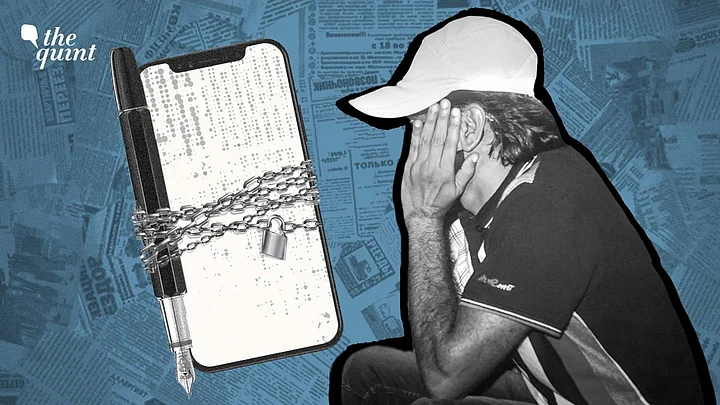The Supreme Court on Tuesday, 12 July extended the interim bail granted to Alt News co-founder Mohammed Zubair in the 'hatemongers' case lodged by the Uttar Pradesh Police case in Sitapur till further orders of the court, said the matter would be listed on 7 September for final disposal.
The UP Police have been given four weeks to file their reply to Zubair's plea seeking quashing of the First Information Report (FIR) registered against him on 1 June over his tweet calling Yati Narsinghanand, Bajrang Muni, and Anand Swaroop "hatemongers."
The matter was briefly heard by Justices DY Chandrachud and AS Bopanna. Senior advocate Colin Gonsalves appeared for Zubair in the hearing.
The Supreme Court had previously granted five-day interim bail to Zubair on Friday, 8 July. The vacation bench which heard the matter specified that this interim bail pertained only to the ‘hatemongers’ case FIR.
This meant that even though Zubair got bail in the hatemongers case, he was not set free as he remained in judicial custody in a case brought by the Delhi Police against him for a separate, four-year-old tweet.
A court in Lakhimpur Kheri also remanded him to 14-days' judicial custody in a separate case by the UP Police regarding one of his old tweets.
What is the 'Hatemongers' Case About & Why is in Supreme Court?
The UP police FIR against journalist and fact-checker Mohammed Zubair had originally been filed under Section 295A (deliberate and malicious acts, intended to outrage religious feelings of any class by insulting its religion or religious beliefs) of the Indian Penal Code and Section 67 of the Information Technology (IT) Act (punishment for publishing or transmitting obscene material in electronic form).
The police later dropped Section 67 of the IT Act and added Section 153A IPC (promoting enmity between different groups on grounds of religion) in the case.
The FIR, filed at Uttar Pradesh’s Khairabad police station, alleges that on 27 May, the informant in the case saw a tweet posted by Zubair on his handle, in which he used the "offensive" term “hatemongers” against “the respected manager of revered religious place Badi Sanghat, P.S. Khairabad and National Patron of National Hindu Sher Sena, Mahant Bajrang Muni Ji.”
“Petitioner also insulted Hindu Yati Narasimha Nar Saraswati and Swami Anand Swaroop on his twitter (sic),” it adds.
This is despite the fact that all the three above-mentioned individuals are reported to have had FIRs against in connection with alleged hate speeches.
Even though there are almost no grounds to make any case for Sections 153A or 295A regarding the tweet, the Allahabad High Court refused to quash the FIR against Zubair.
He then approached the Supreme Court to appeal against this decision, seeking quashing of the FIR and release on interim bail.
What Happened in the SC in the Previous Hearing?
Appearing for Zubair, senior advocate Colin Gonsalves argued that Zubair’s tweets were neither an insult to any religion nor obscene, and said:
“Even if I accept all allegations, no criminal offence is made out against me.”
Further, Gonsalves contended that "the persons who made hate speech, they have been released on bail and the person who exposed them, he is in jail,” and asked: “What has this country become?”
He also asked that since Zubair had not actually spoken against any religion in his tweet, how was it possible to argue that the tweet involved any crime against religion.
Meanwhile, appearing for the Uttar Pradesh government, Solicitor General Tushar Mehta said that the case is not about one tweet by Zubair, but about whether he is part of a "syndicate" which is regularly posting such tweets with the alleged intent to destabilise the society.
Additional Solicitor General SV Raju, on his part, claimed that Bajrang Muni is a respected mahout religious leader in Sitapur with a large following, and thus "when you call a religious leader hatemonger, it raises problems."
Responding to the ASG's contention that Zubair’s application has been moved with ulterior motives and that quashing petitions are not filed during vacation, Justice Indira Banerjee, however, said:
“In a matter of deprivation of personal liberty, you can't say there is no urgency."
While the vacation bench of Justices Banerjee and JK Maheshwari did not make any comments on the merits of the matter, they agreed to grant limited interim relief in the matter and directed it to be listed again on 12 July once the court had reopened.
